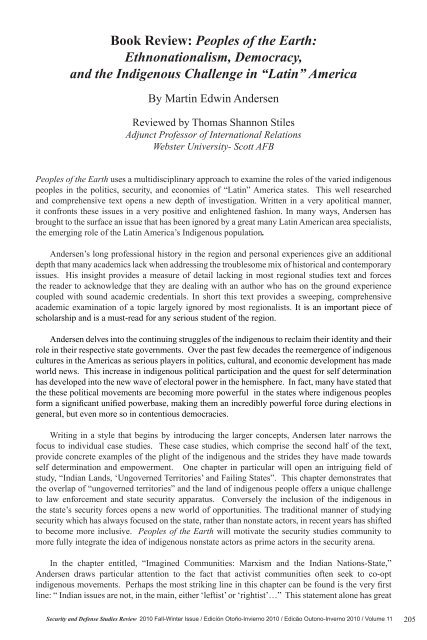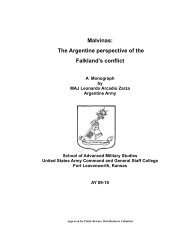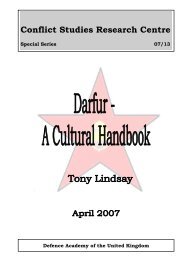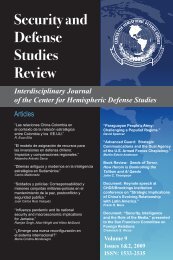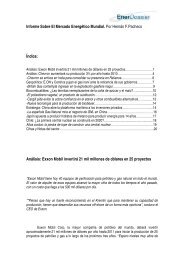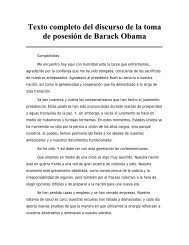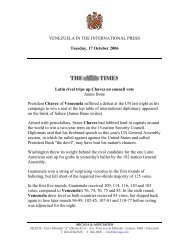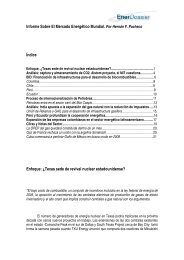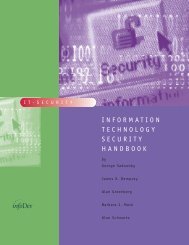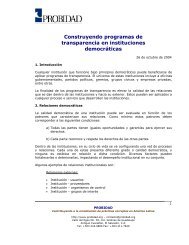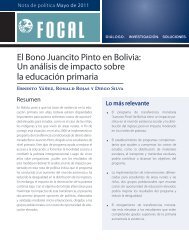Security and Defense Studies Review 2010 Fall ... - Offnews.info
Security and Defense Studies Review 2010 Fall ... - Offnews.info
Security and Defense Studies Review 2010 Fall ... - Offnews.info
- No tags were found...
You also want an ePaper? Increase the reach of your titles
YUMPU automatically turns print PDFs into web optimized ePapers that Google loves.
Book <strong>Review</strong>: Peoples of the Earth:Ethnonationalism, Democracy,<strong>and</strong> the Indigenous Challenge in “Latin” AmericaBy Martin Edwin Andersen<strong>Review</strong>ed by Thomas Shannon StilesAdjunct Professor of International RelationsWebster University- Scott AFBPeoples of the Earth uses a multidisciplinary approach to examine the roles of the varied indigenouspeoples in the politics, security, <strong>and</strong> economies of “Latin” America states. This well researched<strong>and</strong> comprehensive text opens a new depth of investigation. Written in a very apolitical manner,it confronts these issues in a very positive <strong>and</strong> enlightened fashion. In many ways, Andersen hasbrought to the surface an issue that has been ignored by a great many Latin American area specialists,the emerging role of the Latin America’s Indigenous population.Andersen’s long professional history in the region <strong>and</strong> personal experiences give an additionaldepth that many academics lack when addressing the troublesome mix of historical <strong>and</strong> contemporaryissues. His insight provides a measure of detail lacking in most regional studies text <strong>and</strong> forcesthe reader to acknowledge that they are dealing with an author who has on the ground experiencecoupled with sound academic credentials. In short this text provides a sweeping, comprehensiveacademic examination of a topic largely ignored by most regionalists. It is an important piece ofscholarship <strong>and</strong> is a must-read for any serious student of the region.Andersen delves into the continuing struggles of the indigenous to reclaim their identity <strong>and</strong> theirrole in their respective state governments. Over the past few decades the reemergence of indigenouscultures in the Americas as serious players in politics, cultural, <strong>and</strong> economic development has madeworld news. This increase in indigenous political participation <strong>and</strong> the quest for self determinationhas developed into the new wave of electoral power in the hemisphere. In fact, many have stated thatthe these political movements are becoming more powerful in the states where indigenous peoplesform a significant unified powerbase, making them an incredibly powerful force during elections ingeneral, but even more so in contentious democracies.Writing in a style that begins by introducing the larger concepts, Andersen later narrows thefocus to individual case studies. These case studies, which comprise the second half of the text,provide concrete examples of the plight of the indigenous <strong>and</strong> the strides they have made towardsself determination <strong>and</strong> empowerment. One chapter in particular will open an intriguing field ofstudy, “Indian L<strong>and</strong>s, ‘Ungoverned Territories’ <strong>and</strong> Failing States”. This chapter demonstrates thatthe overlap of “ungoverned territories” <strong>and</strong> the l<strong>and</strong> of indigenous people offers a unique challengeto law enforcement <strong>and</strong> state security apparatus. Conversely the inclusion of the indigenous inthe state’s security forces opens a new world of opportunities. The traditional manner of studyingsecurity which has always focused on the state, rather than nonstate actors, in recent years has shiftedto become more inclusive. Peoples of the Earth will motivate the security studies community tomore fully integrate the idea of indigenous nonstate actors as prime actors in the security arena.In the chapter entitled, “Imagined Communities: Marxism <strong>and</strong> the Indian Nations-State,”Andersen draws particular attention to the fact that activist communities often seek to co-optindigenous movements. Perhaps the most striking line in this chapter can be found is the very firstline: “ Indian issues are not, in the main, either ‘leftist’ or ‘rightist’…” This statement alone has great<strong>Security</strong> <strong>and</strong> <strong>Defense</strong> <strong>Studies</strong> <strong>Review</strong> <strong>2010</strong> <strong>Fall</strong>-Winter Issue / Edicíón Otoño-Invierno <strong>2010</strong> / Edicão Outono-Inverno <strong>2010</strong> / Volume 11 205


